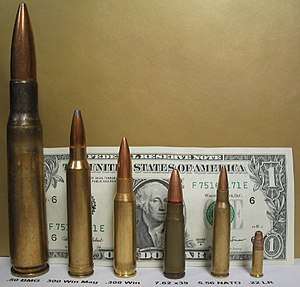Rifle cartridge

A rifle cartridge is a cartridge primarily designed and intended for use in a rifle or carbine.
Types
Intermediate
An intermediate cartridge is a military rifle cartridge that is less powerful than typical full power battle rifle cartridges such as the 7.92mm Mauser or US .30-06, but still significantly more powerful than pistol cartridges.[1] As their recoil is significantly reduced compared to high power rifle cartridges, fully automatic rifles firing intermediate cartridges are relatively easy to control. However, even though less powerful than a traditional rifle cartridge, the ballistics are still sufficient for an effective range of 300–600 metres (980–1,970 ft), which are the maximum typical engagement ranges in combat. This allowed for the development of the assault rifle concept, which is a selective fire weapon that is more compact and lighter than rifles firing full power cartridges. The first intermediate cartridge was the German 7.92×33mm Kurz.[1] Other examples include the Soviet 7.62×39mm used in the AK-47 and AKM series, and the .280 British round developed for the EM-2. The 5.56×45mm NATO cartridge is also an intermediate cartridge.
Full-powered
A full-powered cartridge is a military service rifle cartridge with a minimum effective range of 1000 metres. Most full-powered cartridges have their origin in the turn of the 19th century with the advent of smokeless powder. Examples include 7.62×51mm NATO, .30-06 Springfield, 7.62×54mmR, .303 British, 7.92×57mm Mauser, 7×57mm Mauser or 8mm Lebel. Today they are primarily used only in medium machine guns, battle rifles, and marksman/sniper rifles.
See also
- Ammunition
- Handgun cartridge
- Shotgun shell